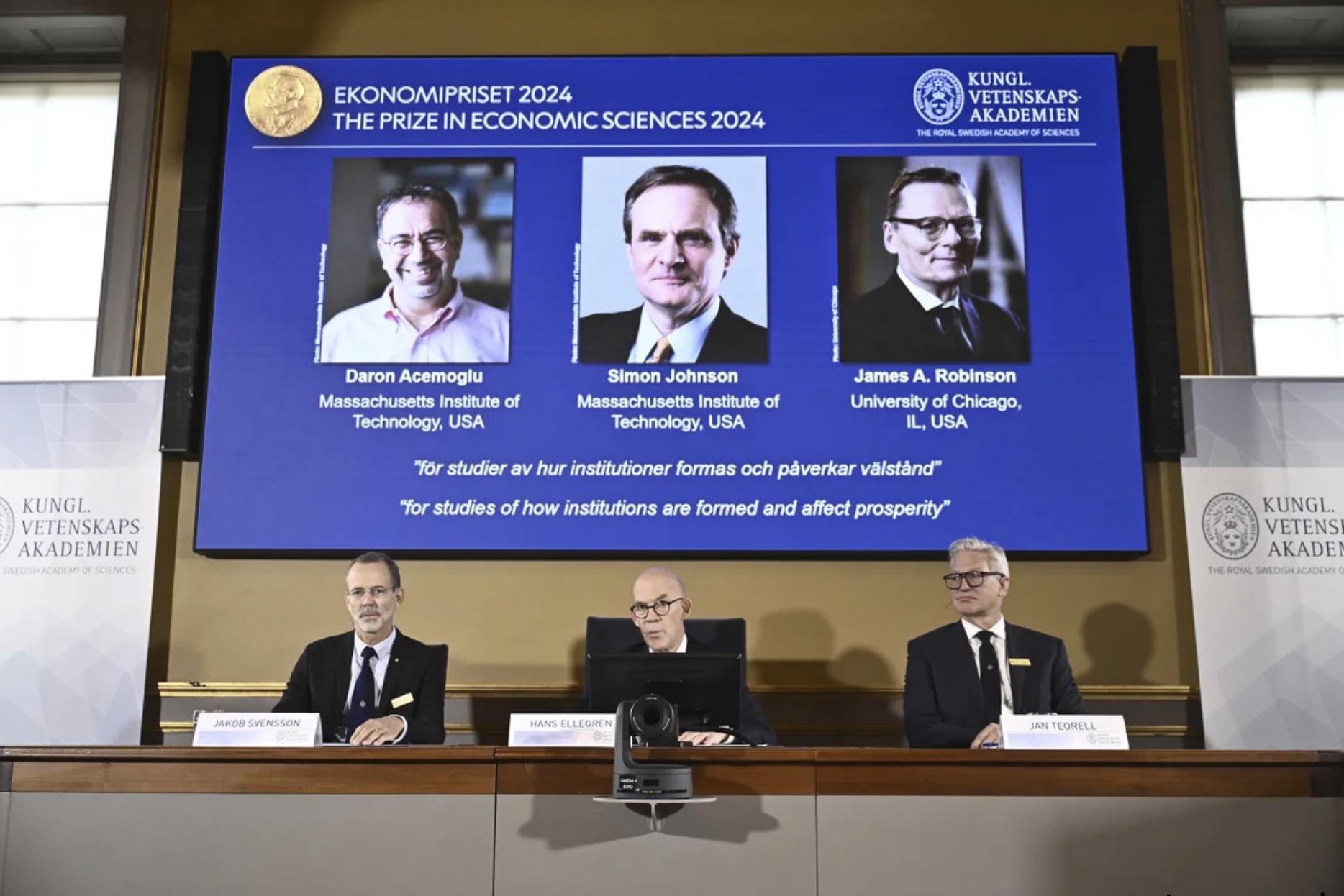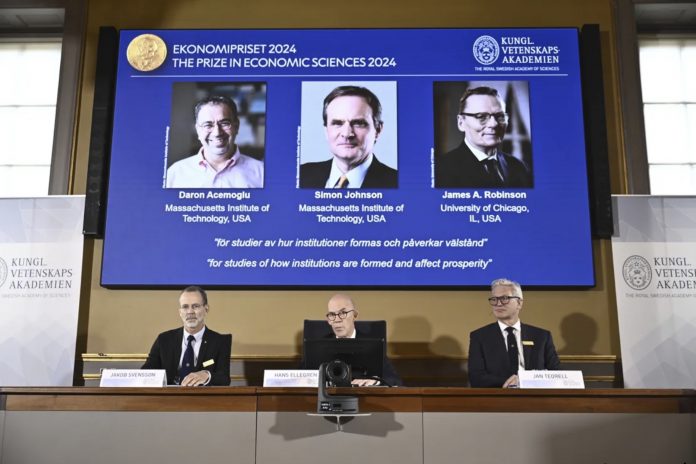เมื่อวันจันทร์ที่ผ่านมา รางวัลโนเบลสาขาเศรษฐศาสตร์ได้มอบให้แก่นักเศรษฐศาสตร์ 3 คน สำหรับผลงานวิจัยเกี่ยวกับบทบาทของสถาบันต่าง ๆ ที่ช่วยอธิบายว่าทำไมบางประเทศถึงเจริญรุ่งเรือง ขณะที่บางประเทศยังคงอยู่ในความยากจน
ดารอน อาเซโมกลู, ไซมอน จอห์นสัน และเจมส์ โรบินสัน จะได้รับรางวัลร่วมกัน โดยรางวัลนี้มีมูลค่า 11 ล้านโครนสวีเดน (ประมาณ 1 ล้านดอลลาร์สหรัฐ)
คณะกรรมการโนเบลกล่าวชื่นชมการศึกษาของทั้งสามคนที่อธิบายว่า “สังคมที่มีระบบกฎหมายอ่อนแอและสถาบันที่เอาเปรียบประชาชน ไม่สามารถสร้างการเติบโตหรือการเปลี่ยนแปลงในทางที่ดีขึ้นได้”
“เมื่อชาวยุโรปเข้าไปล่าอาณานิคมในส่วนต่าง ๆ ของโลก สถาบันในสังคมเหล่านั้นก็เปลี่ยนไป” คณะกรรมการอ้างอิงถึงงานวิจัยของนักเศรษฐศาสตร์ โดยในหลายแห่ง การล่าอาณานิคมมุ่งไปที่การเอารัดเอาเปรียบประชากรท้องถิ่น แต่ในบางแห่ง การล่าอาณานิคมกลับวางรากฐานให้กับระบบการเมืองและเศรษฐกิจที่มีความครอบคลุมมากขึ้น
“ผู้ได้รับรางวัลได้แสดงให้เห็นว่า หนึ่งในเหตุผลที่ทำให้เกิดความแตกต่างทางความมั่งคั่งระหว่างประเทศคือ สถาบันทางสังคมที่ถูกนำเข้ามาในช่วงการล่าอาณานิคม” คณะกรรมการกล่าวเพิ่มเติม
ประเทศที่พัฒนาสถาบันที่ครอบคลุม ซึ่งส่งเสริมการบังคับใช้กฎหมายและสิทธิในทรัพย์สิน ได้เติบโตขึ้นอย่างมั่งคั่งในระยะยาว ขณะที่ประเทศที่พัฒนาสถาบันแบบ “สกัดเอา” ทรัพยากรจากประชาชนเพื่อประโยชน์ของชนชั้นสูง ได้เผชิญกับการเติบโตทางเศรษฐกิจที่ต่ำอย่างต่อเนื่อง
ในหนังสือชื่อ “Why Nations Fail” ที่ตีพิมพ์ในปี 2012 อาเซโมกลู ศาสตราจารย์ชาวตุรกี-อเมริกันจากสถาบันเทคโนโลยีแมสซาชูเซตส์ (MIT) และโรบินสัน ศาสตราจารย์ชาวอังกฤษจากมหาวิทยาลัยชิคาโก ให้เหตุผลว่าประเทศที่ร่ำรวยกว่าเป็นผลมาจากสถาบันทางการเมืองและเศรษฐกิจที่แข็งแกร่ง
หนังสือเล่มนี้เริ่มต้นด้วยการเปรียบเทียบมาตรฐานการครองชีพในเมืองสองเมืองที่มีชื่อว่าโนกาเลส หนึ่งเมืองอยู่ในรัฐแอริโซนา สหรัฐอเมริกา และอีกเมืองอยู่ทางใต้ของพรมแดนในรัฐโซโนรา ประเทศเม็กซิโก แม้ว่านักเศรษฐศาสตร์บางรายจะเชื่อว่าความแตกต่างด้านสภาพภูมิอากาศ การเกษตร และวัฒนธรรมมีผลกระทบต่อความเจริญรุ่งเรืองของสถานที่ แต่ อาเซโมกลู และโรบินสัน ให้เหตุผลว่าผู้ที่อาศัยอยู่ในโนกาเลส แอริโซนา มีสุขภาพและความมั่งคั่งที่ดีกว่าเนื่องจากสถาบันท้องถิ่นที่แข็งแกร่งกว่า
เมื่อปีที่ผ่านมา อาเซโมกลูและจอห์นสัน ซึ่งเป็นศาสตราจารย์ชาวอังกฤษ-อเมริกันจาก MIT ได้ตีพิมพ์หนังสือ “Power and Progress” ซึ่งศึกษาเกี่ยวกับนวัตกรรมทางเทคโนโลยีในช่วง 1,000 ปีที่ผ่านมา ตั้งแต่ความก้าวหน้าด้านการเกษตรไปจนถึงปัญญาประดิษฐ์ (AI) ซึ่งมักจะเอื้อประโยชน์แก่ชนชั้นนำ มากกว่าจะสร้างความมั่งคั่งให้กับคนทั่วไป
ผู้เขียนเตือนว่า “ทิศทางปัจจุบันของ AI ไม่เป็นผลดีต่อเศรษฐกิจหรือประชาธิปไตย”
ประชาธิปไตยเท่ากับการเติบโตทางเศรษฐกิจหรือไม่?
เมื่อถูกถามว่างานวิจัยของพวกเขาเป็นการโต้แย้งว่าประชาธิปไตยนำไปสู่การเติบโตทางเศรษฐกิจหรือไม่ อาเซโมกลูตอบว่า “งานวิจัยของเราสนับสนุนประชาธิปไตย” แต่เขาเสริมว่าประชาธิปไตย “ไม่ใช่ยาวิเศษ”
“ข้อโต้แย้งของเราคือการเติบโตแบบเผด็จการมีความไม่เสถียรมากกว่า และโดยทั่วไปไม่ได้นำไปสู่การสร้างนวัตกรรมที่รวดเร็วและดั้งเดิม” อาเซโมกลูกล่าวในสัมภาษณ์ทางโทรศัพท์ระหว่างพิธีประกาศรางวัล
ในหนังสือ “Why Nations Fail” เขาและโรบินสันให้เหตุผลว่าจีนเนื่องจากขาดสถาบันที่ครอบคลุม จะไม่สามารถรักษาการเติบโตทางเศรษฐกิจไว้ได้ อย่างไรก็ตามกว่าทศวรรษหลังจากการตีพิมพ์หนังสือ อาเซโมกลูยอมรับว่าจีนเป็น “ความท้าทาย” ต่อข้อโต้แย้งนั้น เนื่องจากรัฐบาลปักกิ่งได้ทุ่มเงินลงทุนในสาขานวัตกรรม เช่น AI และรถยนต์ไฟฟ้า
“แต่จากมุมมองของผม รัฐเผด็จการเหล่านี้จะเผชิญกับความยากลำบากในการบรรลุผลลัพธ์ด้านนวัตกรรมที่ยั่งยืนในระยะยาว” เขากล่าว
รางวัลสาขาเศรษฐศาสตร์นี้เป็นที่รู้จักอย่างเป็นทางการในชื่อ รางวัลวิทยาศาสตร์เศรษฐกิจแห่งธนาคารแห่งสวีเดนในความทรงจำของอัลเฟรด โนเบล โดยแตกต่างจากรางวัลในสาขาฟิสิกส์ เคมี การแพทย์ วรรณกรรม และสันติภาพ รางวัลนี้ไม่ได้ถูกก่อตั้งโดยอัลเฟรด โนเบล แต่โดยธนาคารกลางแห่งสวีเดนในปี 1968
ปีที่แล้ว รางวัลนี้ได้มอบให้กับคลอเดีย โกลดิน ศาสตราจารย์จากมหาวิทยาลัยฮาร์วาร์ด สำหรับงานวิจัยเกี่ยวกับผู้หญิงในตลาดแรงงาน
โกลดินใช้ข้อมูลกว่า 200 ปีของสหรัฐอเมริกาเพื่อแสดงให้เห็นว่าความแตกต่างด้านค่าจ้างระหว่างเพศเปลี่ยนแปลงไปตามกาลเวลา โดยในอดีต ความแตกต่างนี้ส่วนใหญ่เกิดจากความแตกต่างด้านการศึกษาและอาชีพ แต่ในช่วงประวัติศาสตร์ที่ผ่านมา เธอพบว่า ความแตกต่างนี้ส่วนใหญ่อยู่ระหว่างผู้ชายและผู้หญิงที่ทำงานในอาชีพเดียวกัน และเกิดขึ้นอย่างชัดเจนเมื่อผู้หญิงมีลูกคนแรก
Nobel Prize in economics awarded to trio for explaining why some nations are rich and others poor

Three economists were awarded the Nobel Prize Monday for their research into how the nature of institutions helps explain why some countries become rich and others remain poor.
Daron Acemoglu, Simon Johnson and James Robinson will share the prize, which carries a cash award of 11 million Swedish kronor ($1 million).
The Nobel Committee praised the trio for explaining why “societies with a poor rule of law and institutions that exploit the population do not generate growth or change for the better.”
“When Europeans colonized large parts of the globe, the institutions in those societies changed,” the committee said, citing the economists’ work. While in many places this was aimed at exploiting the indigenous population, in other places it laid the foundations for inclusive political and economic systems.
“The laureates have shown that one explanation for differences in countries’ prosperity is the societal institutions that were introduced during colonization,” the committee added.
Countries that developed “inclusive institutions” – which uphold the rule of law and property rights – have over time become prosperous, while those that developed “extractive institutions” – which, in the laureates’ words, “squeeze” resources from the wider population to benefit the elites – have experienced persistently low economic growth.
In their 2012 book “Why Nations Fail,” Acemoglu, a Turkish-American professor at the Massachusetts Institute of Technology (MIT), and Robinson, a British professor at the University of Chicago, argue that some nations are wealthier than others because of their political and economic institutions.
The book opens with a comparison of living standards in two towns called Nogales – one in Arizona and one south of the border in Mexico’s Sonora region. Whereas some economists have argued that differences in climate, agriculture and culture have huge impacts on a place’s prosperity, Acemoglu and Robinson argue that those living in Nogales, Arizona, are healthier and wealthier because of the relative strength of their local institutions.
Last year, Acemoglu and Johnson – a British-American professor at MIT – published “Power and Progress,” a study of how technological innovations over the past 1,000 years, from agricultural advances to artificial intelligence, have tended to benefit the elites, rather than creating prosperity for all.
The authors warned that “the current path of AI is neither good for the economy nor for democracy.”
Democracy equals growth?
Asked whether their research simply argues that “democracy means economic growth,” Acemoglu said “the work we have done favors democracy” but added that democracy “is not a panacea.”
“Our argument has been that this sort of authoritarian growth is more unstable and does not generally lead to very rapid and original innovation,” Acemoglu said in a phone interview during the announcement ceremony.
In “Why Nations Fail,” he and Robinson argued that China, because it lacks inclusive institutions, would not be able to sustain its economic growth. More than a decade since the book’s publication, Acemoglu said China has posed a “bit of a challenge” to that argument, as Beijing has been “pouring investment” into the innovative fields of AI and electric vehicles.
“But my perspective is generally that these authoritarian regimes, for a variety of reasons, are going to have a harder time in achieving long-term, sustainable innovation outcomes,” he said.
The economics prize is officially known as Bank of Sweden Prize in Economic Sciences in Memory of Alfred Nobel. Unlike the prizes for physics, chemistry, medicine, literature and peace, it was not instituted by the Swedish industrialist but rather by Sweden’s central bank in 1968.
Last year, the prize went to Claudia Goldin, a professor at Harvard University, for her research into women in the labor market.
Using more than 200 years’ worth of US data, Goldin showed how the nature of the gender pay gap has changed over time. Historically, much of the gap could be explained by differences in education and occupation. But in more recent history, she found, the bulk of the gap has been between men and women in the same occupation, and it largely emerges when a woman has her first child.
By Christian Edwards, CNN

















